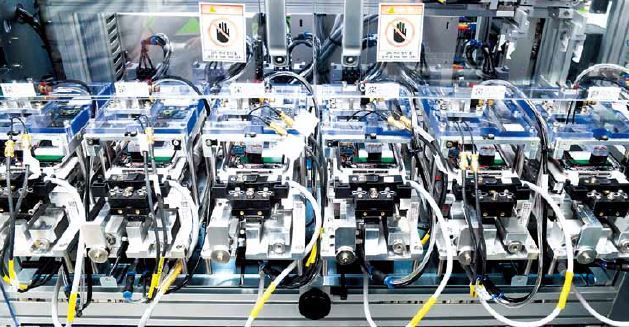Samsung seeks fresh start after disclosing cause of Note 7 fires
이 글자크기로 변경됩니다.
(예시) 가장 빠른 뉴스가 있고 다양한 정보, 쌍방향 소통이 숨쉬는 다음뉴스를 만나보세요. 다음뉴스는 국내외 주요이슈와 실시간 속보, 문화생활 및 다양한 분야의 뉴스를 입체적으로 전달하고 있습니다.
Samsung Electronics on Monday admitted its mistake and provided a detailed explanation about the technical faults of its flagship smartphone, in an apparent effort to regain trust from consumers across the globe and start afresh.
At a lengthy press conference, the tech giant’s CEO Koh Dong-jin made a public apology about the battery defect in the Galaxy Note 7, with overseas experts endorsing the test results along with him.
It was the first time for Samsung to disclose research jointly carried out with external advisory groups, the company said.
“We judged it was essential to provide a clear and sufficient explanation about the cause to global consumers, since the Note 7 battery explosions were a global issue,” said a spokesman at the company.
“Our primary goal of planning this detailed presentation was to gain back consumer trust and reveal the investigation findings transparently.”
Market analysts welcomed Samsung’s move.
“Today’s announcement was seen as Samsung’s willingness to move forward,” said John Soh, the head of corporate analysis at Shinhan Investment Corp.
The chief analyst gave credit to Samsung’s decision to take all the responsibility for the battery problem and the company’s attitude of not placing blame on its suppliers.
“Since there is no problem found yet with the Galaxy S7 series, it was just the Note 7 that had a mistake,” Soh added. “With Samsung’s resolute promise, the upcoming Galaxy S8 is even more highly expected.”
For the past four months, Samsung, an archrival of US smartphone maker Apple, has been suffering global humiliation for producing the fire-prone smartphone. The Galaxy Note 7 was discontinued in October and caused losses of about 7 trillion won ($5.9 billion).
Despite the losses, the electronics unit announced an earnings surprise of 9.2 trillion won for the fourth quarter of 2016. The figure was the largest since the third quarter of 2013. If it successfully overcomes the battery issue, Samsung could reach 10 trillion won in the first quarter, market analysts say.
The announcement on the day also reflects Samsung’s determination to seek to turn the current crisis into a new opportunity by offering consumers safer products.
Koh said the company would make all-out efforts to beef up the safety of its upcoming smartphones.
“Samsung will use X-ray scanners in a quality control process that can detect flaws in smartphone batteries and implement a tear-down process for randomly selected products,” said the Samsung mobile chief, vowing to ensure its products -- including the Galaxy S8 -- meet the highest safety standards in the industry.
The CEO said most of the new quality control measures announced on the day have already been applied to the entire process -- from product design to manufacturing -- of rolling out the S8, Samsung’s flagship smartphone to be released, presumably, in March.
New Samsung smartphones to be released this year will have enough room for the battery to expand and feature updates of software algorithms to prevent overcharging and overheating, according to the tech firm.
Samsung’s procedures to improve the safety of smartphone Lithium-ion batteries will be provided to global standards organizations for the sake of the smartphone and battery industries.

Samsung SDI, the major battery provider for Samsung’s Galaxy smartphones, is also regaining market confidence as the company will stay as the main supplier for the upcoming devices.
SDI announced on the same day it has invested about 150 billion won on improving the safety of its products.
“Concerns about the battery maker’s performance this year have been eased,” said Lee Won-sik, an analyst at Hana Financial Investment. “SDI is expected to continue supplying batteries for Samsung’s next flagship smartphone, which would help the company see recovery in earnings starting from the second quarter.”
The company’s polymer battery sales recovered since November to a level prior to the Note 7 crisis, according to Samsung SDI on Monday.
“From the first quarter of this year, battery sales are forecast to increase significantly,” the company said. “The internal atmosphere is that the company has turned the crisis into an opportunity.”
“Safety will be our new top priority and DNA,” said Cho Nam-seong, the CEO of Samsung SDI in his New Year’s speech earlier this month.
By Song Su-hyun and Kim Young-won
(song@heraldcorp.com) (wone0102@heraldcorp.com)
<ⓒKoreaHerald(www.koreaherald.com)무단전재 및 재배포 금지>
Copyright © 코리아헤럴드. 무단전재 및 재배포 금지.